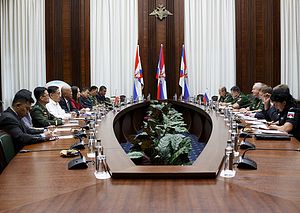This week, Philippine Defense Secretary Delfin Lorenzana was on a quick trip to Russia. Though the visit was just one in a series of interactions between Manila and Moscow, it nonetheless put the focus on some ongoing developments in the Philippine-Russia relationship, which has seen some gains under the so-called independent foreign policy of President Rodrigo Duterte despite Manila’s traditional status as a U.S. treaty ally.
As I have noted before in these pages, one of the consequences of Duterte’s so-called independent foreign policy, which seeks to boost the country’s outreach with countries like China and Russia, has been the slow but sure development of Russia-Philippine defense, despite the lingering challenges that still exist (See: “Where Are Russia-Philippines Defense Relations Under Duterte?”). A number of items have been in the headlines over the past few months, including the Philippines potentially purchasing Russian submarines and the first-ever port visit by Philippine vessels to Vladivostok.
This week, Lorenzana was on a visit to Russia in a development that once again spotlighted the defense component of the relationship. During his visit, he and his delegation, which also participated in the Army 2018 International Military and Technical Forum and National Security Week, also met with a range of Philippine defense officials, including Deputy Defense Minister Alexander Fomin. Those discussions touched on various components of military-to-military ties, including port visits, exchanges, equipment, and military exercises.
While most of the details discussed were not unveiled publicly, Lorenzana offered a few specifics about how some aspects are progressing thus far as those conversations take place. For instance, on exchanges, where both sides already concluded a basic agreement back in 2009 governing this aspect of ties, Lorenzana indicated that both sides were looking to add to this. He noted that Philippine defense attaché in Russia, Colonel Dennis Pastor, was helping look at military courses that Philippine officials and students could use to improve their capabilities.
On port visits, Lorenzana did not delve into additional details that were discussed. But as I noted earlier this week, indications thus far are that we could see this take shape quite quickly in the coming weeks, with a Philippine port visit to Vladivostok to reciprocate earlier Russian visits to the Philippines for now set to occur sometime in September.
No further specifics were offered on the subject of military exercises either, which is another point of interest within the development of defense ties. While progress thus far has been quite modestly limited to things like Philippine personnel observing Russian exercises, some basic drills or interactions could also take shape.
On military equipment, unsurprisingly, the focus of the media was on submarines in particular. Philippine defense spokesperson Arsenio Andolong had mentioned earlier that Russia had offered a soft loan to the Philippines for the purchase of two submarines, even though things were technically still at the research stage for Manila. Lorenzana confirmed that the possible purchase of Russian submarines was discussed, but stressed that Moscow knew that the Philippines was still shopping and had yet to decide where to buy. He also reinforced the fact that other countries were in the mix, including South Korea and more cost-effective options as well, which Andolong had earlier said also included France and Indonesia.
To be sure, as the various aspect of the defense relationship continue to be discussed, it is important to note that there are limits to potential progress that can be made on several counts. Indeed, Lorenzana himself alluded some of them. For example, he noted that exchanges would take a while to take shape because they would partly depend on how quickly Philippine officials were able to learn Russian, which is tied to a broader point about how linguistic differences that can have wider and more significant implications for communication and interoperability.
Similarly, on submarines, he also appropriately reaffirmed the fact that cost was a key consideration for the Philippines when it came to submarines, not just in terms of procurement, but other aspects such as developing the infrastructure around a submarine program and then maintaining and operating it. How exactly Manila can address that affordability issue is still unclear and remains a key issue, as I have observed previously (See: “Is the Philippines Moving Closer to Submarines Under Duterte?“).
Nonetheless, as the defense component of the relationship between the two sides continues to take shape, the extent to which we will see tangible progress in some of these areas will be interesting to watch, both for its own sake and also within the broader prism of Philippine foreign and defense policy.
































